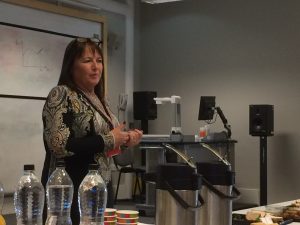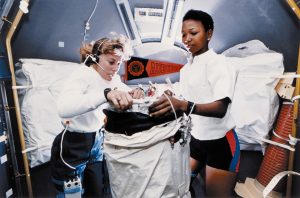
This month, we brought together women from across the University who have attended the Aurora programme, a leadership programme to help address the issue of women being less represented in senior roles. There are more than 40 Aurora alumni at Newcastle University, with over half of those coming from our Faculty. Here, Jane Richards, our Deputy Director of Faculty Operations, tells us more about what she got out of Aurora, and why she is taking the lead in setting up a new group at the university for participants and alumni from the programme.
I attended the programme when it was still at the pilot stage in 2013/14. I was asked to participate by our Registrar to help test the water, along with an academic colleague. I presume that I was chosen because I had been identified as having leadership potential, and so was both flattered and enthusiastic about participating.
That pilot year was an interesting one. A particular highlight of the programme was the ‘Learning Set’, which involved a group of us meeting to help each other approach particular problems we had back at work. I was struck by how similar our issues were, in that regardless of our background, discipline or planned career path, we all felt hampered by our environment in achieving what we wanted. And we didn’t all want to be Professors, PVCs or Registrars. Some of us wanted to be the best we could be in a small pond, and it was important to recognise that that’s alright too. Good leaders are essential at all levels in the University.
I remember my action from the Learning Set was to knock on doors and ask for a pay rise… I won’t tell you the result! But my colleagues pointed out that my male colleagues wouldn’t think twice about doing it. “What’s the worst thing that can happen?”, my Learning Set asked me, and it has been my mantra ever since.
I was inspired to get this group together for a number of reasons:
- To give something back to the University for investing in me
- To identify a powerful voice for women in leadership at the University
- To create a community of alumni and potential entrants to Aurora (some of us are from the same Schools and didn’t even know each other, even when we’d been in same Aurora cohort!)
- To support other women into leadership
- To celebrate the impact of the Aurora programme
I have been thinking about organising the group for a long time, as I have been a role model and mentor for a few years without sharing my experience with other role models and mentors. We can learn from each other and make a difference if we pool our knowledge: we can be better at what we do.
Our first meeting set the principles and purpose of the group, and I was encouraged that I had done the right thing by getting this group together. As I suffer like many others with “imposter syndrome”, I had worried that others would not share my vision. We all recognised the need to support each other and new participants and applicants. We all also wanted to be part of the community.
We have decided to meet more regularly, to welcome new participants, to encourage alumni to become mentors, to look for funding for our events, to be ambassadors for women into leadership and to make the selection process for applicants more transparent. The University has invested time and money into our development and we feel strongly that re can provide returns on that investment.
Wish us luck!




